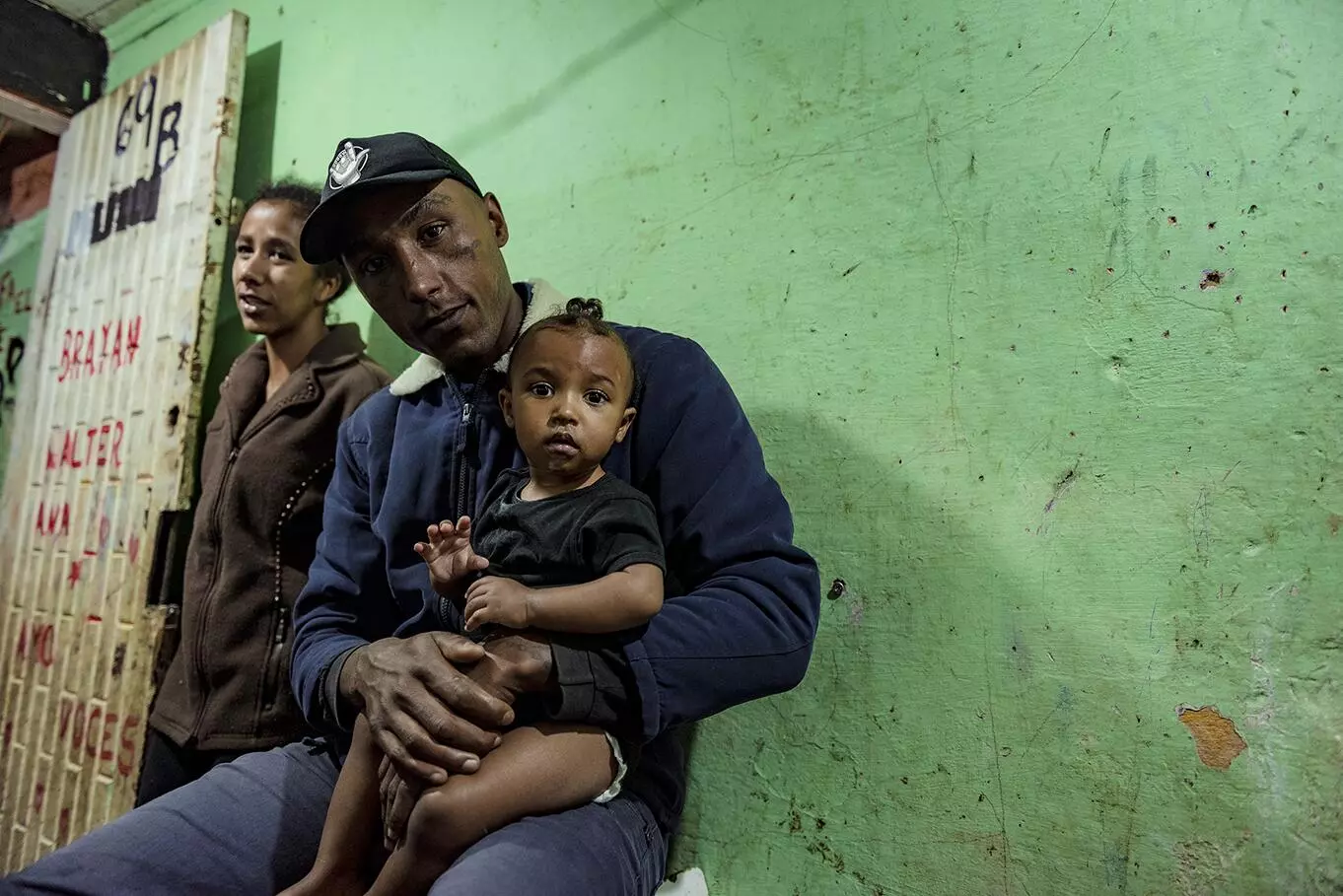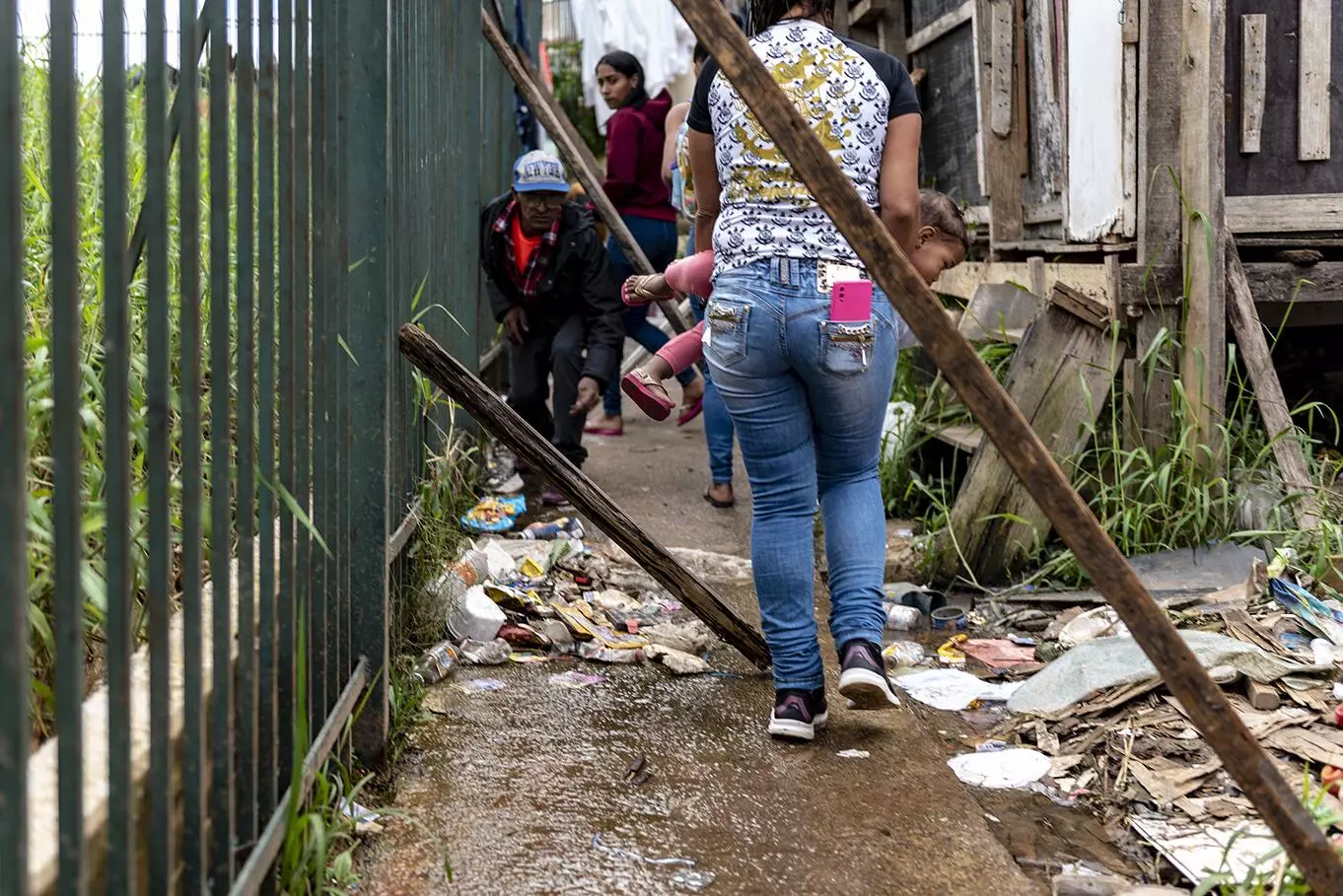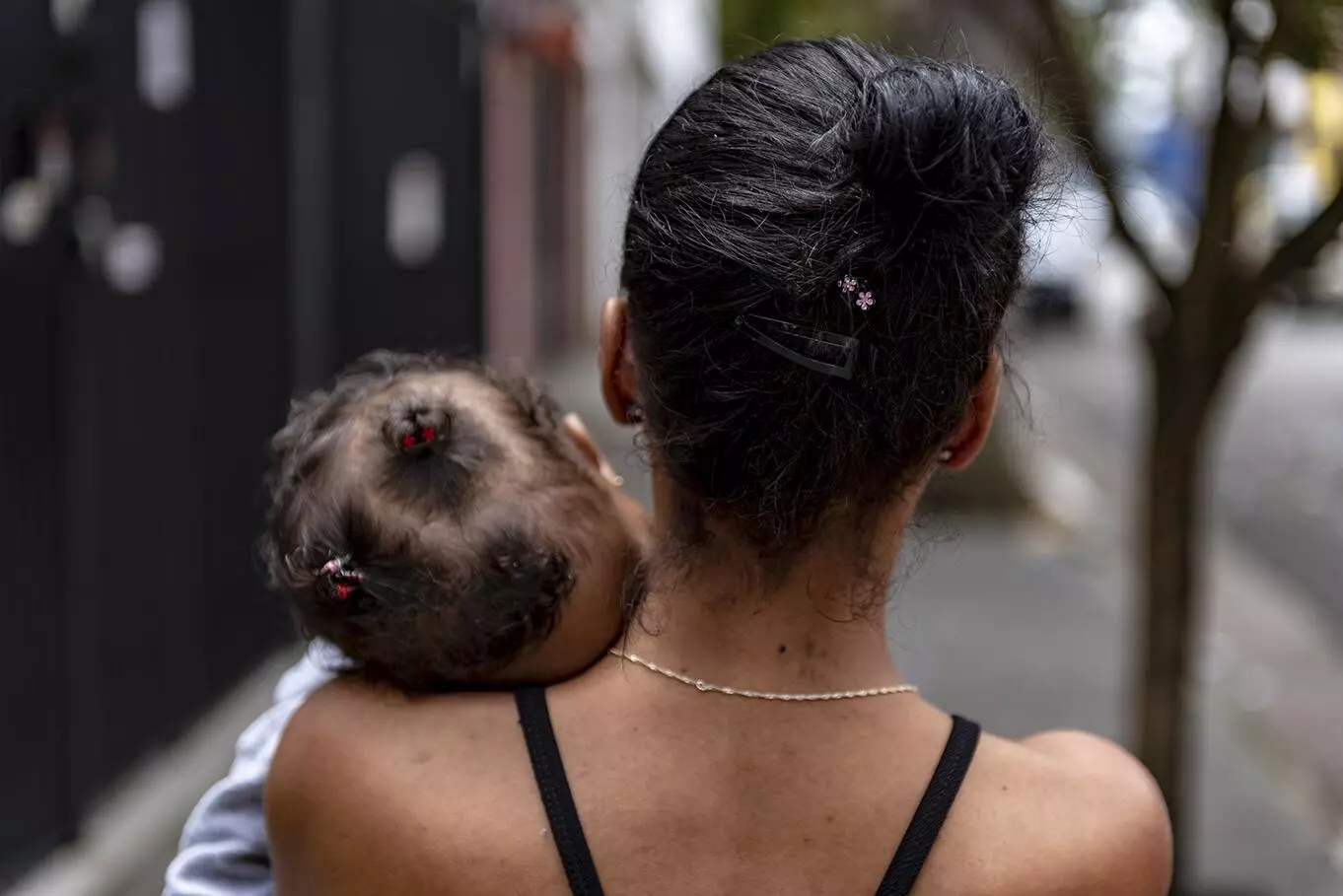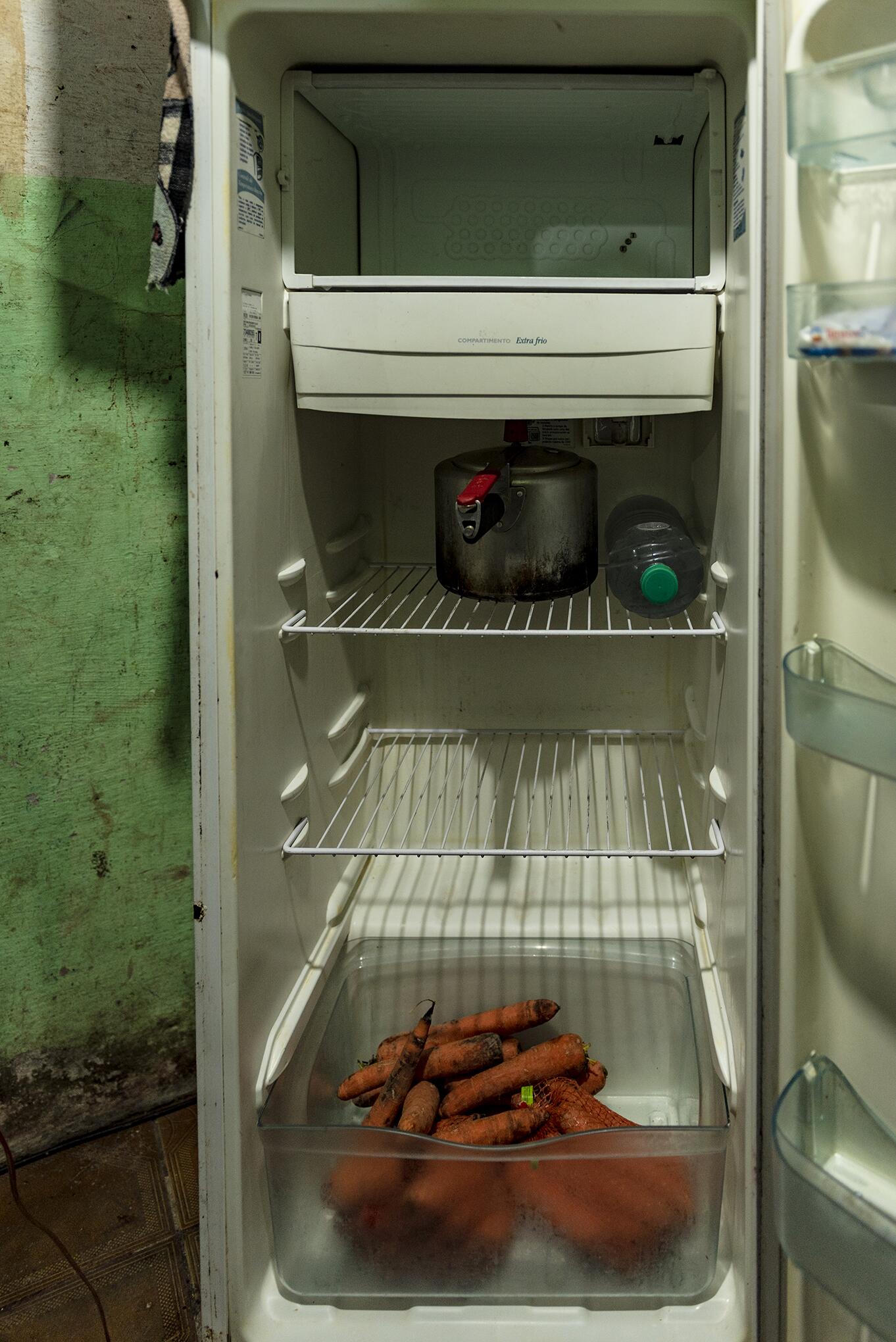Ana Mirtes da Silva Santos squeezes past her old oven, trying to dodge the drips from the ceiling. Her tiny wooden house, where the living room is separated from the bedroom by a flimsy partition, is home to her and her ten-year-old son Samuel. There’s a sink, a table, a TV, a bicycle, a fridge, a single bed shared by mother and son, a checked blanket that covers the window in place of glass, and a few items of clothing. On the cement floor, scraps of what was once carpet, soaked by the water dripping through the gaps in the ceiling, squelch underfoot. Ana weeps as she recounts how the previous day when the rain fell relentlessly, her t-shirt was drenched before she even stepped outside. And there are plenty of other reasons for her tears: since the pandemic drastically reduced the amount of casual cleaning work she could get, she and Samuel often eat rice with lettuce, or cornmeal porridge, for their main meal of the day. And when there isn’t enough food for two, she feeds her son and goes to bed hungry. “There’s a gnawing in my stomach,” she says.
It is the Tuesday before the most important election since democracy returned to Brazil in 1985. On Sunday, the country would go to the polls to decide whether former president and Workers’ Party candidate, Luiz Inácio Lula da Silva, and the far-right incumbent Jair Bolsonaro, would clash in a sure-to-be-bitterly-contested second-round run-off. A resident of the richest city, and the state with the most voters, in the country, Ana Mirtes has no say in the matter, as poverty has stripped her of her basic right to elect who will run Brazil. While her choice was Lula, she did not vote because the cost of the bus fare to the polling station would mean less money to spend on food. Two hours before the polls opened, she found herself choosing between voting and eating. It was the same decision faced by many of her neighbours, and contributed to the highest abstention rates at a Brazilian presidential election since 1998: in a country where voting is mostly compulsory, 20.95% of Brazilians stayed at home.
For those who do not know how they’ll feed themselves each day, worrying about who will govern the country is a luxury. Although the right to food is enshrined in the Brazilian constitution, in the alleys of this community in São Paulo’s South Zone there is no lack of stories that reveal the lengths people are forced to go to in search of food. Donations of basic food parcels provide rice, beans, pasta, flour, cooking oil and cornmeal. But the neighbourhood only receives 35 such parcels for its 500 families, explains the leadership of a community organisation in Chuvisco, which uses a rota to distribute the parcels amongst the neediest families. For fruit and veg, many depend on the generosity of market traders, who deliver their leftover stock when they close their stalls for the day. Protein has to be bought, and generally takes the form of eggs or cheap sausages, the least expensive options.
The favela is a snapshot of a hungry Brazil, where only four in ten families have adequate access to food, according to figures published in June by the Brazilian Research Network on Food and Nutrition Sovereignty and Security (widely known as the Penssan Network, after its acronym in Portuguese). A total of 33.1 million Brazilians – a level equivalent to the 1990s – fall into the most serious category of food insecurity, of those who do not eat three meals a day. In a country that left the United Nations Hunger Map in 2014, 14 million people have fallen into this category in a little more than a year (between the end of 2020 and the beginning of 2022). The data shows that 15.4% of Brazilian families do not have breakfast each day, 10% don’t always have lunch, and 19.9% sometimes miss out on dinner. Another category includes those that, despite not suffering from hunger on a daily basis, do not have guaranteed access to food: three out of ten families in Brazil describe the daily worry of not knowing what they will have to eat the next day.
Food insecurity in Brazil has been worsening since 2016, explains Rosana Salles Costa, a researcher from the Penssan Network. The austerity policies of the Michel Temer government, rising unemployment, and cuts to the National Food Security Council, which monitored and proposed government policy in the area, and which was gutted on Jair Bolsonaro’s first day in office, meant Brazil was already in a weakened state when COVID-19 struck. Bolsonaro’s response to the pandemic, with a terribly delayed vaccine rollout, made the crisis worse. This perfect storm led to a sharp increase in hungry Brazilians.
The topic of hunger has returned to the front pages during the election. Bolsonaro substituted the Bolsa Família (Family Allowance) support package brought in during Lula’s first term in office in 2003 for Auxílio Brasil (Brazil Aid), which pays out R$600 per month – but which, according to National Budget forecasts, may be cut to R$405 in 2023. He also promised to bring this month’s payment forward to before the run-off vote, in an attempt to sway the poorest voters. Lula, meanwhile, has discussed adopting fellow presidential candidate Ciro Gomes’ proposal of a Monthly Basic Income payment of R$1,000, in return for Gomes’ support. According to Rosana, however, who is also a professor at the Institute of Nutrition at Rio de Janeiro Federal University, income transfer programmes are not enough to end hunger. What is needed, she argues, are government policies that, as well as boosting the economy, include a price freeze on basic food parcel items, which in the last year alone rose between 13.4% and 26,54% in Brazilian state capitals, according to the Inter-union Department of Statistics and Socioeconomic Studies. In São Paulo, a worker earning the minimum monthly wage of R$1,212 spends up to 69,31% of their income on such basic food items.
Ana Mirtes received her first R$600 Auxílio Brasil payment in September. “The money goes nowhere,” she says. “The gas alone costs R$125. I use a rabo quente (literally, a “hot tail”) to save money and make it last longer,” she explains, pointing to a shower heating element dangling over the sink, where she heats water before putting it on the stove, to speed up the cooking process. It’s a dangerous contraption, which could easily set her home, and subsequently those of her neighbours, on fire. In addition to food, she still needs to buy clothes, medicine, and items of personal hygiene, in a Brazil where prices are skyrocketing. “If it weren’t for the food parcels and the market, I don’t know what we’d do,” she says. Ana digs through the neighbourhood rubbish to look for cans to sell, but as more and more people are forced to do the same, it sometimes takes two weeks to gather the 70 units that make up a kilo, which she can sell for R$6.

Rafael Damasceno, Ritiele Patriste and their 1-year-old daughter Ana Clara. With no hope of the outcome, he decided not to vote. Photo: Isabella Finholdt/SUMAÚMA
In a house a few streets away, Rafael Damasceno, 27, also decided not to vote on 2 October. “I thought about it,” he says. “But they all make promises, then end up stealing.” Instead, he decided to take advantage of the sunny Sunday to sell sweets at the traffic lights, at the end of a week where the constant rain had made such work difficult. Around lunchtime, he learned his casual work as an iFood delivery man had earned him R$150. With the money, he could finally afford meat and potatoes. And so on election day he decided to stay at home and enjoy a decent lunch with his wife and four children. He had enough to feed his family until Thursday, he calculated. But even so, voting was not part of his plans, simply because he had little hope the results of the election would make things better for him.
On the Tuesday before the election, his wife, Ritiele Patriste, 23, opens the refrigerator and points to the almost empty shelves. On the bottom shelf are two large clumps of already blackened carrots. Above them, a bottle of water and a pot with some cooked beans. In the door, there is a pot of mustard, some lard, and a single egg, left over from the day before. While the cupboard contains a few packages of beans, sugar, rice, pasta and oil — from a food parcel the family received a few days ago — there’s only that single egg to complete a lunch for six people. When he finds out he’s earned R$6 more from iFood, Rafael decides to buy nine more eggs to add to the meal.
Before the pandemic, he worked as a gardener, and life for the family was more stable. But then he lost his job and became part of Brazil’s 9.7 million unemployed (according to the latest data from the Brazilian Institute of Geography and Statistics). Unable to afford his own transport, he has to wait for the bike owned by his uncle, also a delivery man, to become free before he can work. As a result, he can’t earn every day, and doesn’t know for sure when his wages will arrive. As recently as last month, the family could only eat when they received the donation of a basic food parcel, while they managed to obtain free fruit and vegetables from the leftovers at the market. But any extra money had to come from Rafael’s deliveries, or from selling sweets at the traffic lights. “When we have nothing, we have to ask the neighbours for help. Or go through the rubbish to collect cans,” Ritiele explains.
In September, she also received her first R$600 Auxílio Brasil payment, which she says improved things a little. But the money doesn’t cover the costs of raising four young children. In addition to the gas, water and electricity bills, she needs to buy more milk, nappies, hygiene products and clothes. Only going to school ensures the children eat properly each day. “I take them because they get breakfast and lunch there. When they get home we just have to give them a little something,” she says. But in a week of heavy rain, when the alleys turn to rivers and only planks of wood save feet from a soaking, the children have to stay indoors.
Frequently missing meals can deprive the body of essential nutrients, such as vitamins, proteins and minerals, meaning a hungry person lacks the energy to carry out day-to-day activities – especially physical tasks. The immune system weakens, and individuals are more susceptible to infectious diseases.
Depending on the severity and duration of hunger, bones and muscles can weaken, explains Inês Rugani, a professor at the Institute of Nutrition at Rio de Janeiro State University. Children are even more vulnerable. A lack of essential nutrients can slow growth, and in the first two years, when the nervous system is being formed, there may be losses in cognitive capacity, leading to difficulties in learning and interaction. Hunger is, therefore, a scar that lasts a lifetime, regardless of whether an individual has adequate access to food in the future.

Camila, Joyce and their mother, Andrea Gomes de Souza, cross a stream on the way to vote. Photo: Isabella Finholdt/SUMAÚMA
On election day, Camila, 24, Joyce Cristina, 18, and their mother, Andrea Gomes de Souza, 43, are leaving their three-room house at the entrance to the favela. Their hair still wet from the shower, they walk in single file along a narrow path, their progress partially impeded by wooden poles propping up a wall. They tread carefully, knowing the slightest misstep could send their feet, protected only by flip-flops, into the murky cocktail of water and sewage that runs alongside the path.
The group are on their way to vote at a polling station a 50-minute walk away. However, when Andrea arrives at the school where she’s voted for the last few years, in the middle of the upscale Campo Belo neighbourhood, she finds it has been transformed into an apartment block. According to the Superior Electoral Court website, her new polling station is miles away, and she gives up on her plans. As Joyce hasn’t yet registered to vote, only Camila is left, holding her one-year-and-eight-month-old daughter Ana Vitória in her arms. Eventually, she manages to reach the polling station, with its electronic urns, at another, more distant, school.
She has made the trip having eaten only a plain cracker that day. In the desperate battle for food, there are some lucky days, like the previous afternoon, when the family bought steaks after a brother-in-law earned a little money from selling copper wire. And there are days of dismal luck, where there is nothing to eat and the only option is to go to bed hungry, and hope things get better in the morning. “Hunger hurts. My head hurts, my stomach hurts. I feel a sadness in my heart,” she says. Since the beginning of the pandemic, and especially now she has a baby, it has been difficult to make ends meet with casual work at the supermarket or as a babysitter, as she used to. Luckily, her daughter has a place at a nursery, where she gets all her meals, she explains as she walks through the wealthy neighbourhood where the polling station is situated. A white man glances at Ana Vitória. “Is she up for adoption? I want her!” he says, laughing. “Are you going to adopt me too?” the young mother retorts angrily.

Camila Gomes de Souza and daughter Ana Vitória, 1 year old: emotionless after voting. Photo: Isabella Finholdt/SUMAÚMA
Camila registered as a voter this year, after her stepfather convinced her of the importance of making her voice heard. Today, she presses the number 13 to vote for Lula. She is surprised to find she also has to vote for two members of congress, a senator, and a state governor. The experience of voting, however, doesn’t seem to have lifted her mood, and she says she found the electronic urn awkward to use. She leaves the polling station, on her way to the birthday party of a niece, who lives with her father in another favela. When she finally gets home, she has no idea what there will be to eat.
Translated by James Young





